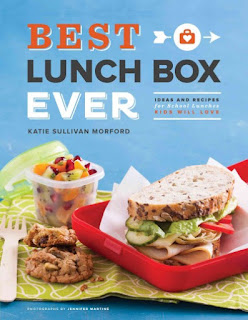
At this time of year the thought of packing lunches can cause a
lot of stress. Your library can help!
Visit us for these excellent books packed carefully with ideas, recipes,
and inspiration for tasty lunches the little people in your life will actually
eat!
The school year survival book : healthy recipes andsanity-saving strategies for every family and every meal (even snacks) by Ceri
Marsh
This book is perfect for busy parents with picky eaters. The
author outlines how to plan dinners with lunch-worthy leftovers, and includes
recipes for deceptively healthy baking.
Yum-yum bento all year round : box lunches for every season by
Crystal Watanabe and Maki Ogawa. The term “bento” might be familiar if you like
oriental food. Basically it is a single-serving meal that is served in tidy,
compartmentalized containers -- perfect for those who don’t like their food to
touch! This book is heavy on the cute, and you might find yourself enjoying the
pictures more than the ideas.
Weelicious lunches : think outside the lunch box with more than160 happier meals by Catherine McCord.
This book started as a blog (weelicious.com), and includes menu planning ideas,
tips, tricks, and reusable product suggestions to make lunch fun and advice on
dealing with food allergies.
Best lunch box ever : ideas and recipes for school lunches kidswill love by Katie Sullivan Morford. The author of this book is a registered
dietitian and mother of three. She
offers quick and simple solutions for wholesome, balanced meal. The 65 recipes
are easy, delicious, and packed with nutrients for well-rounded lunches and
snacks, including Deconstructed Caprese Skewers, Easy Cheesy Thermos Beans,
Pesto Pita Pizza, Cinnamon Wonton Crisps, Parmesan Kale Chips, Crispy
Applewiches, and more.
Kids' lunches : eat in, take out by Jean Paré. Jean Paré is the
well-known author of the well-loved Company’s Coming cookbooks. This book is
written for kids, and includes lots of handy tips and hints. Get your kids
involved in making their own lunches to teach them life-skills, and to save you
time.
The brown bag lunch cookbook by Miriam Jacobs. This book is
great for anyone who takes their lunch. If you need to break out of your ham
sandwich rut, check out this book and make your brown bag the envy of your
colleagues! Great for adults and kids.
The vegetarian lunchbasket : over 225 easy, lowfat, nutritious,recipes for the quality-conscious family on the go by Linda Haynes. Even if
you’re not strictly vegetarian you might want to check out this book, and
change up your lunch menu. Adventurous eaters can try new ways of packing
lunches, using leftovers, and combining foods, while learning to use
alternatives to meats, eggs, mayonnaise, margarine, and oils - lowering fats
and cholesterol yet maintaining taste and variety.
The natural lunchbox : vegetarian meals for school, work &home by Judy A. Brown. Another vegetarian take on lunch, this cookbook includes
recipes for kashi salad, lime yogurt guacamole, baked pita chips, vegetable
kabobs, marinated baked tofu nuggets, and minestrone soup.
Check out these cookbooks and get ready for stress-free lunch
making!



